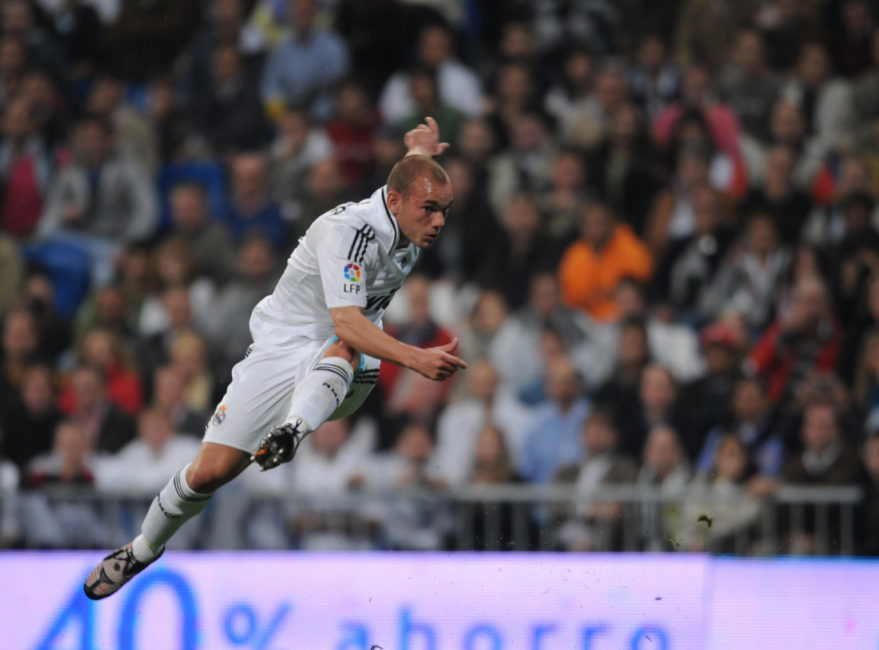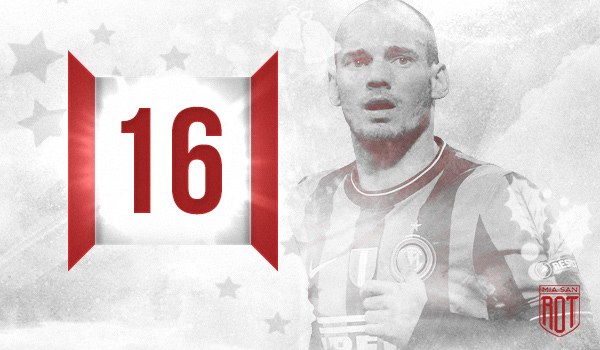The MSR advent calendar: Our favorite signings that never happened: Door 16 – Wesley Sneijder
The situation at FC Bayern
The summer of 2009 was a very special one for FC Bayern. In retrospect, it is now often seen as the beginning of an era, almost a dynasty, that has continued to this day, but at the time there was no talk of eras anywhere. The memories of the proud club’s display at Camp Nou weeks earlier were too fresh, the scepticism of the seemingly eternal talent Bastian Schweinsteiger finally being able to take the next step too great, the prospect of Franck Ribéry’s departure the following summer too certain and the early impressions of the new coach Louis van Gaal too strange.
The Dutch football coach gave FC Bayern a crash course in game organization, ball possession, passing angles and video analysis. This might sound exciting to today’s ears, but FC Bayern also had games to win and they just did not seem to be all that interested in such seemingly extraneous stuff at the beginning. After only managing a draw on each of the first two matchdays, Bayern were confidently beaten by Thomas Tuchel’s young Mainz team on the third, leaving them with two meagre points after three games. The screwed up start to the season was perfect.
The situation with the player
The day Arjen Robben signed for FC Bayern is probably the most exciting transfer day in many a Bayern fan’s memory. I, for one, can still remember very well how I went back and forth between my PC and my TV to check for teletext updates every minute (yes, they still used teletext for transfer rumours back then, hard to believe…).
But the day had started out very badly for me: The day before, the transfer of the one player I had been longing for all summer to FC Bayern had finally fallen through. From the beginning of the summer, my entire focus had been on Wesley Sneijder; at that time, I did not dare dream of Arjen Robben.
If Robben became available, bigger clubs would surely snatch him up in a hurry, I believed, and why would Real Madrid want to give away such a great player anyway? He might be struggling with injury problems, but for one, a fit Robben was clearly a difference maker even in a star studded Real team, and for another, selling him would have made no sense at all. Real Madrid eventually signed Cristiano Ronaldo that summer, a left winger for a then record transfer fee, so there was still room for Robben as a right winger.
At the same time, however, Kaká was brought in for almost the same amount of money for the attacking midfield, which should have rendered Real’s two Dutch number tens Wesley Sneijder and Rafael van der Vaart surplus to requirements. The latter nevertheless stayed with Real for another year, but Sneijder eventually moved to Inter Milan for an even then comparatively measly €15 million.

(Image: Pierre-Philippe Marcou/AFP via Getty Images)
The hypothetical role in the team
Why was FC Bayern not interested given these conditions? Inter may have brought in José Mourinho, a hot name on the coaches carousel then as now, but that did not make them a bigger club than FC Bayern. The Calciopoli scandal and the upheaval at AC Milan had left Inter Italy’s sole top club of international caliber, but for years they had been regularly eliminated in the Champions League even sooner than Bayern.
The new focus on passing under van Gaal also meant that capable passing players were needed, and FC Bayern was lacking those. Van Gaal experimented in the positions behind the first line of attack, starting Alexander Baumjohann (yes, that is right, Baumjohann began the Bundesliga season in the starting eleven), José Ernesto Sosa and even Miroslav Klose on the first three matchdays.
In the back of his mind, van Gaal still planned to ultimately put Ribéry there, but those plans came to nothing. It is obvious what Sneijder would have brought to the team; for the central attacking midfield position, which was so vitally important for the coach’s approach, Sneijder would have been a perfect fit. Because Sneijder was born for this position: Excellent distribution, excellent shot, ambidextrous, technically skilled, good vision – a born playmaker for possession football. Incidentally, this makes the fact that he had his greatest successes playing in counter-attacking teams only stranger.
The ‘what if’ outlook
This advent calendar is about our favorite transfers that never occurred, but retrospectively I do not actually wish that Sneijder had joined Bayern, because everything has worked out perfectly just the way it did. Especially because there is one name that I have neglected to mention so far: Thomas Müller. What he would be capable of and grow into in the fullness of time at Bayern, I was of course completely unaware at the time. How could I have been? A lanky offensive player without a particularly good technique or passing game, Müller’s qualities were certainly not recognisable at first glance.
But only a short time later it would be “Müller always plays!” and even though I am pretty sure that in the beginning, apart from Louis van Gaal and Hermann Gerland, hardly anyone from within the club was convinced of Thomas Müller as a regular starting XI player, one can only be glad that there was no playmaker brought in from the outside who would have been able to stand in his way.
Because as good as Sneijder may have been, he was not better than Müller. Well, he was in the 2009/10 season. That season, after all, saw Wesley Sneijder at the peak of his powers and the pinnacle of his career. But over the entirety of his career, let alone the decade that was about to begin, he was not in my eyes equal to Müller. If you factor in Müller’s leadership and off-field qualities as well, the distance becomes even greater. Müller’s value to the club as a source of identity, face of the club, and on-field leader is immeasurable.
You could, of course, try to squeeze Sneijder together with Müller and Robben into one team, but Sneijder would then only have blocked another club legend. Schweinsteiger and Sneijder as a midfield tandem would not have worked with the version of players Bayern had at the time.
Even if you find that Schweinsteiger as a total package was never better than he was in that one year, he was actually stronger in defense in later seasons. In 2009/10 he still needed the help of a combative van Bommel to keep things tight, years later he would easily dominate the defensive midfield single-handedly as the lone anchor player in holding midfield. This later version of Bastian Schweinsteiger might have made such an attacking midfield together with Thomas Müller and Wesley Sneijder workable, but the freshman central midfielder of 2009/10 would not have been able to.
So instead of Sneijder, Arjen Robben came in and I could not have been happier. Arjen Robben had been an even better player and deal even back then. If Müller had not undergone such a phenomenal development, there would be valid reasons now to wallow in wistful thinking about a ‘Double Dutch’, but this way everything turned out in the best possible way for everyone involved.
It is just a pity that Sneijder’s Inter ultimately shattered Bayern’s Champions League dreams. But without Sneijder, Inter would hardly have progressed against Guardiola’s legendary Barça, so the result would probably have been the same either way.
Hint: Behind the next door hides one of the most loyal footballers of his time, who might yet have been tempted to sign with Bayern in the course of his club’s major squad overhaul in 2012.





